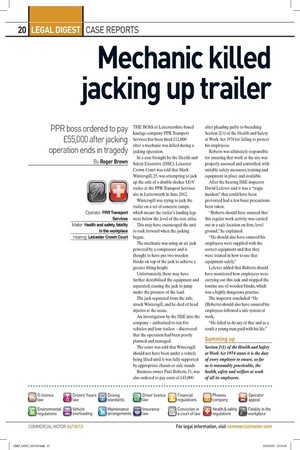Mechanic killed
Page 15

If you've noticed an error in this article please click here to report it so we can fix it.
jacking up trailer
PPR boss ordered to pay £55,000 after jacking operation ends in tragedy By Roger Brown
THE BOSS of Leicestershire-based haulage company PPR Transport Services has been fined £12,000 after a mechanic was killed during a jacking operation.
In a case brought by the Health and Safety Executive (HSE), Leicester Crown Court was told that Mark Wintersgill, 25, was attempting to jack up the axle of a double-decker LGV trailer at the PPR Transport Services site in Lutterworth in June 2012.
Wintersgill was trying to jack the trailer on a set of concrete ramps, which meant the trailer's landing legs were below the level of the rear axles.
This may have encouraged the unit to rock forward when the jacking began.
The mechanic was using an air jack powered by a compressor and is thought to have put two wooden blocks on top of the jack to achieve a greater lifting height.
Unfortunately, these may have further destabilised the equipment and separated, causing the jack to jump under the pressure of the load.
The jack separated from the axle, struck Wintersgill, and he died of head injuries at the scene.
An investigation by the HSE into the company — authorised to run five vehicles and four trailers — discovered that the operation had been poorly planned and managed.
The court was told that Wintersgill should not have been under a vehicle being lifted until it was fully supported by appropriate chassis or axle stands. Business owner Paul Roberts, 51, was also ordered to pay costs of £43,000
after pleading guilty to breaching Section 2(1) of the Health and Safety at Work Act 1974 for failing to protect his employees.
Roberts was ultimately responsible for ensuring that work at the site was properly assessed and controlled, with suitable safety measures, training and equipment in place and available.
After the hearing HSE inspector David Lefever said it was a "tragic incident" that could have been prevented had a few basic precautions been taken.
"Roberts should have ensured that this regular work activity was carried out in a safe location on firm, level ground," he explained.
"He should also have ensured his employees were supplied with the correct equipment and that they were trained in how to use that equipment safely."
Lefever added that Roberts should have monitored how employees were carrying out this task and stopped the routine use of wooden blocks, which was a highly dangerous practice.
The inspector concluded: "He (Roberts) should also have ensured his employees followed a safe system of work.
"He failed to do any of that and as a result a young man paid with his life." Summing up
Section 2(1) of the Health and Safety at Work Act 1974 states it is the duty of every employer to ensure, so far as is reasonably practicable, the health, safety and welfare at work of all its employees.








































